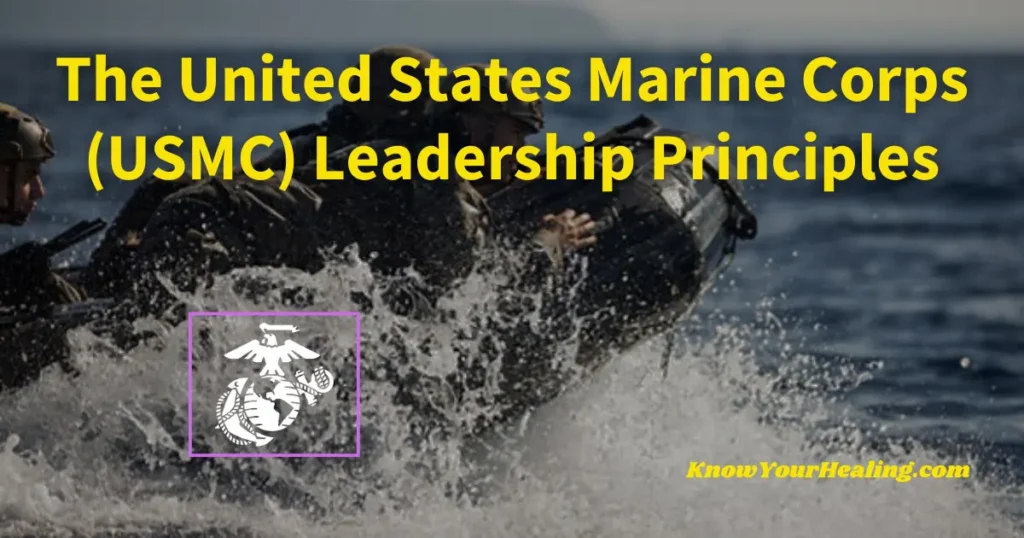The United States Marine Corps (USMC) Leadership Principles are essential guidelines that have shaped effective leaders within the Corps.
These principles aim to build strong and capable leadership.
By focusing on these core values, the USMC ensures leaders are prepared to handle challenges with honor and courage.
Understanding the 11 principles can be crucial for anyone looking to enhance their leadership abilities.
Each principle provides insights into leading with integrity and dedication, which are vital in military and civilian settings.
These principles encourage a leader to be knowledgeable and empathetic, fostering a culture of respect and accountability.
Readers interested in leadership development will find these insights valuable in their journeys.
By exploring how these values apply to everyday leadership, one can cultivate a more disciplined and driven approach to effectively leading teams.
To learn more about these guiding principles, visit the comprehensive details in the Marine Corps Leadership document.
History and Evolution of the USMC
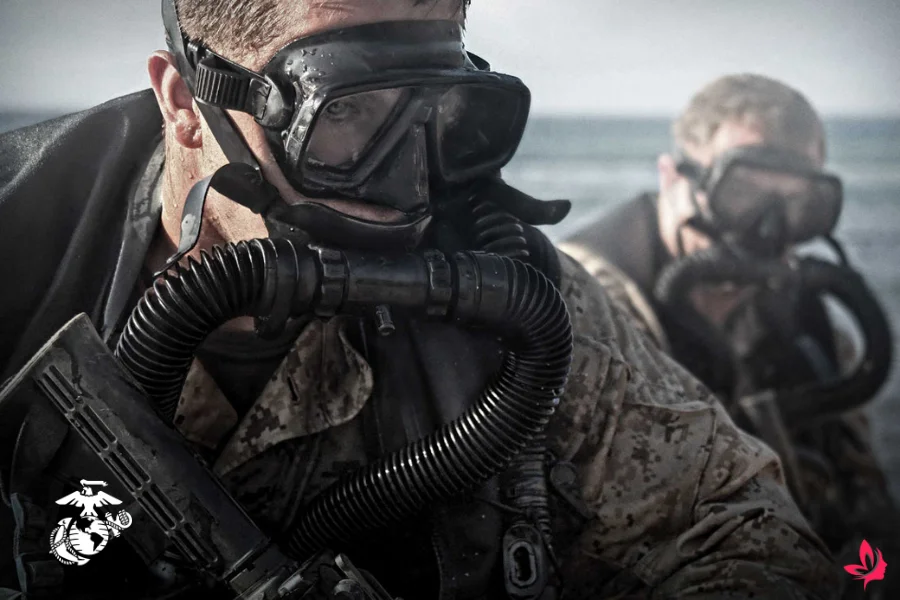
The United States Marine Corps plays a crucial role in military leadership, emphasizing mission accomplishment and a sense of responsibility. Its leadership principles and development have evolved alongside its history, cementing its reputation for effective leadership and capability.
Origins of the Marine Corps
The United States Marine Corps was established in 1775 with the creation of the Continental Marines.
Their primary mission was to conduct ship-to-ship combat and provide shipboard security.
The early Marines set a standard for discipline and obedience, laying the groundwork for core values such as courage and commitment, which remain vital.
Over time, the Marine Corps evolved to meet changing military needs, emphasizing an adaptable leadership style necessary for mission success.
This adaptability helped shape the Marines as an elite fighting force within the larger U.S. military framework.
As the Corps grew, units were extensively trained in infantry and amphibious operations, showcasing the Marines’ ability to execute orders precisely and effectively.
Key Conflicts and Roles Over Time
Throughout history, the Marine Corps has played a pivotal role in several key conflicts.
In challenging circumstances, marines demonstrated sound judgment from World War I to the Vietnam War.
Their capacity for good decisions and unwavering loyalty to fellow Marines were essential leadership traits.
They have continually adapted to different warfare styles and technological advancements, refining these Marine Corps leadership principles.
In World War II, the Marines participated in significant amphibious assaults across the Pacific, serving as a model of a good leader facing immense pressure.
After Vietnam, the Corps improved its training and tactics, focusing more on physical stamina and professional development.
They continue to serve as capable leaders in modern conflicts, reflecting a consistent commitment to the country’s values.
Basic Tenets of USMC Leadership
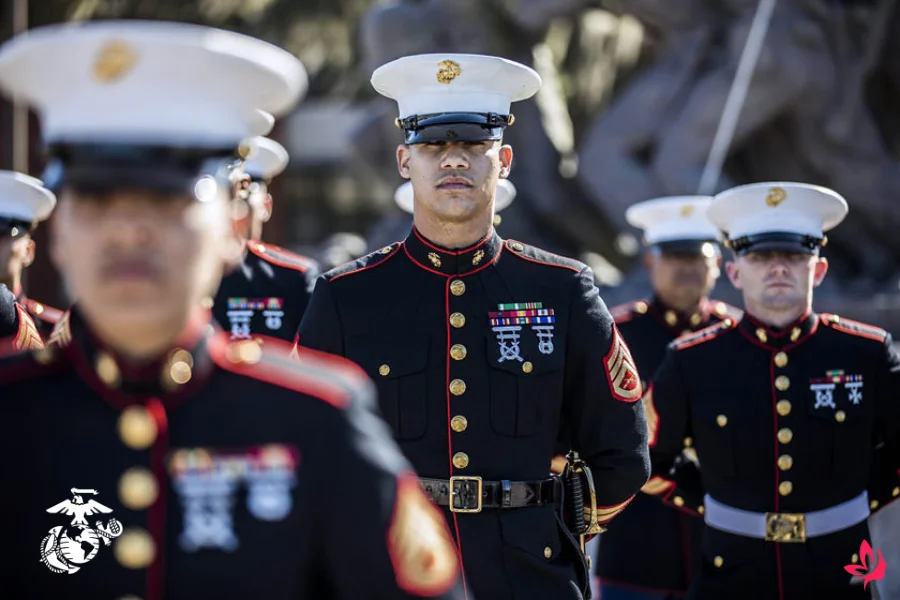
The United States Marine Corps (USMC) leadership is rooted in principles that cultivate effective leadership and build strong units.
These principles focus on developing leaders who can make sound decisions and demonstrate unwavering loyalty.
The 14 Leadership Traits
The USMC identifies 14 leadership traits vital for any marine leader.
These traits include justice, judgment, dependability, initiative, decisiveness, tact, integrity, enthusiasm, bearing, unselfishness, courage, knowledge, loyalty, and endurance.
Each trait contributes to the sum of intellect and moral character qualities necessary for leadership development.
Justice and judgment help in making timely decisions in a threatening situation.
Initiative and decisiveness are crucial for maintaining a proactive leadership style, while integrity and unselfishness ensure that actions do not seek personal gain at the expense of others.
Physical stamina and courage are necessary for overcoming challenges and reinforcing the chain of command.
Each trait supports the core values and builds confidence among fellow Marines.
The Leadership Principles of the USMC
The Marine Corps Leadership Principles provide a framework for developing capable leaders.
These principles emphasize the importance of knowing oneself and seeking self-improvement to enhance leadership skills.
U.S. Marines are encouraged to set a professional example and always act professionally to inspire others.
Recognizing the absence of orders and making sound decisions under pressure is crucial.
These principles ensure leaders understand their unit tasks and foster an environment where mission accomplishment is a priority.
A strong leader maintains good relations within the team framework, understanding the physical needs and moral behavior of those they lead.
The USMC leadership principles guide marines to achieve the highest discipline.
Developing Effective Leadership
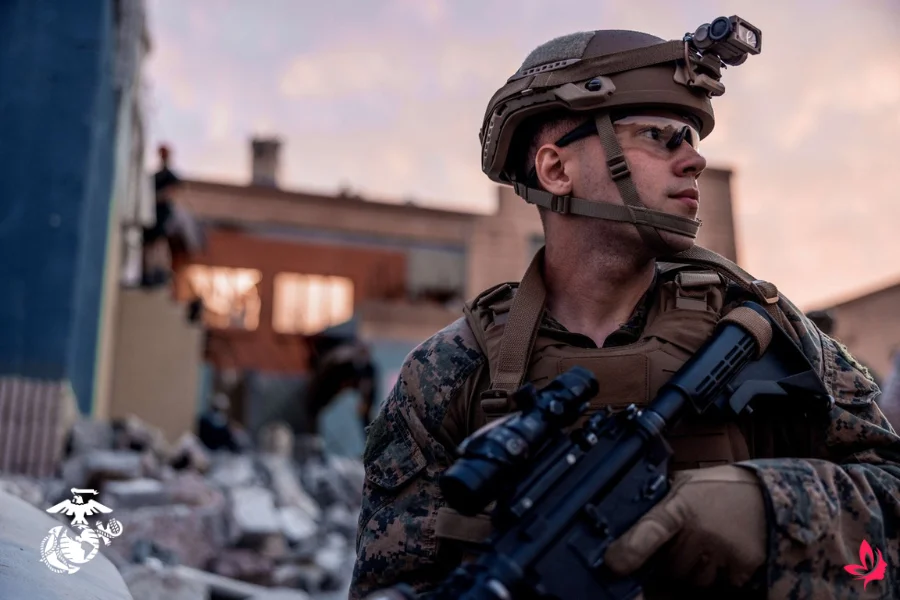
Effective leadership is crucial for mission accomplishment within the United States Marine Corps.
It can be achieved through systematic training, education, and learning from experienced mentors.
Leadership traits and principles are essential in developing capable leaders within the corps.
Training and Education
Training and education form the foundation for developing effective Marine Corps leadership.
Training programs are essential to instill leadership skills and a sense of responsibility in Marines.
These programs often focus on courses covering key leadership aspects, like sound decisions, the chain of command, and core values.
The emphasis is on practical exercises replicating real-life situations, encouraging Marines to make timely decisions.
Physical stamina and mental quality are also addressed through rigorous training.
This approach teaches Marines to lead with moral character and professionalism.
This training prepares them to become strong leaders capable of inspiring fellow Marines.
Mentorship and Experience
Mentorship and experience play a pivotal role in leadership development.
Experienced Marines provide guidance and share their knowledge about intellect and human understanding.
A good leader learns from peers and superiors, fostering good relations and confidence within the unit.
Experienced leaders teach by example, demonstrating how to maintain a spotless uniform and exhibit unwavering loyalty to the Corps.
Through these experiences, Marines learn to handle difficult decisions.
This exposure helps them develop the outer signs of these ideals, become better leaders who can effectively manage unit tasks, and inspire their fellow Marines to achieve their best efforts.
More about these leadership principles can be found in the Marine Corps Leadership Development manual.
Leadership in Action
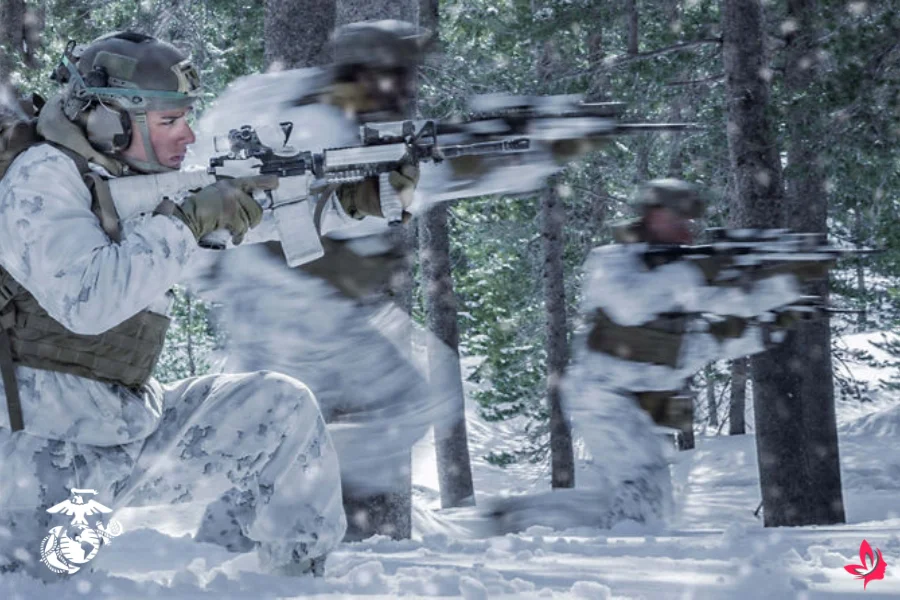
The effectiveness of a Marine leader is often demonstrated through sound decisions and moral character.
By examining real-life examples, it’s possible to see how the Marine Corps leadership principles come to life, especially in challenging situations.
Case Studies of Marine Leaders
Marine leaders exemplify the values of the United States Marine Corps in various ways.
A notable example is Major General John A. Lejeune, who emphasized the importance of core values and leadership traits.
His actions during World War I showcased a sense of responsibility and unwavering loyalty to his mission and fellow Marines.
Lieutenant General Lewis “Chesty” Puller is another celebrated figure.
Known for his fearless leadership style and sound judgment, Puller inspired Marines with his ability to remain calm and decisive in threatening situations.
These leaders have set a good example for others, proving that effective leadership often relies on qualities such as mental quality and moral principles.
Decision-Making Under Pressure
Marine leaders are often required to make timely decisions, even without orders.
This ability to act promptly stems from their adherence to the USMC leadership principles.
A leader’s capacity for sound judgment is tested in complex scenarios where a clear decision can mean the difference between failure and mission accomplishment.
Leaders are trained to assess situations quickly and understand the big picture.
They demonstrate strong values of the country and maintain confidence among their teams.
Making difficult decisions under pressure requires the courage to remain steadfast in the face of danger, a quality that all Marines are instilled with
This reinforces the importance of capable leaders who inspire and motivate others by their actions.
Future of Leadership in the USMC
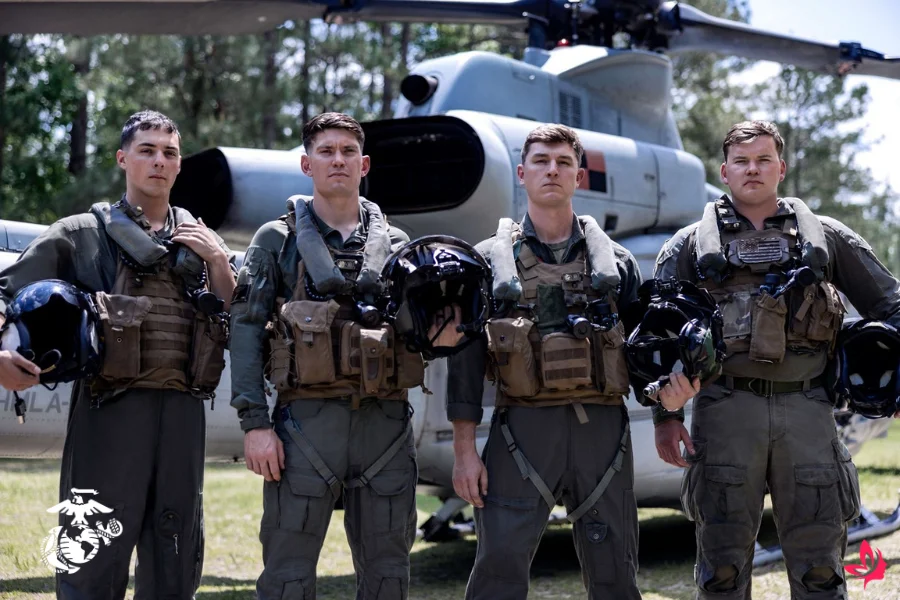
The future of leadership in the United States Marine Corps will focus on embracing modernization and innovation while adapting to new challenges.
This shift aims to ensure Marines remain effective leaders in an ever-evolving environment.
Modernization and Innovation
The Marine Corps is integrating modernization to improve leadership development.
A key aspect involves updating training programs to enhance leadership traits and strengthen core values.
This ensures that leaders can make sound decisions and demonstrate a strong sense of responsibility.
Technological advancements play a critical role.
New platforms and tools allow leaders to assess unit tasks more efficiently.
Artificial intelligence and data analytics enhance understanding of complex situations, leading to better mission accomplishment.
The Marine Corps demonstrates unwavering loyalty to its mission and personnel by incorporating these technologies.
Modern changes in leadership style also focus on fostering good relations within the team framework.
The Corps encourages a culture where mutual confidence and professional development are prioritized.
This helps future Marine leaders stay adaptable and practical.
Adapting to New Challenges
The Marine Corps must address new challenges to maintain its reputation for good leadership.
Adapting to the complexities of current events requires decisive leaders who understand the big picture.
Leaders must navigate the absence of orders by showing initiative and making timely decisions to guide their fellow Marines.
The Corps also focuses on challenges related to diversity and inclusivity.
Marine leaders can make more informed, quality decisions by cultivating an environment where human beings are valued for their unique perspectives.
Addressing these matters ensures a strong leader can emerge from within.
Physical stamina and the ability to make concise orders are essential qualities.
Training programs emphasize these traits to prepare Marines for success.
This approach helps ensure leaders can meet tough goals with the highest discipline, even in challenging situations, reflecting the values of the Corps and the country.
Final Thoughts
The United States Marine Corps (USMC) leadership principles are foundational for developing effective leaders.
These principles include being tactically proficient in knowing yourself and seeking self-improvement.
By incorporating these traits, Marines cultivate resilient and adaptable leadership.
Key aspects of these principles focus on discipline, professionalism, and moral courage.
Traits like justice, judgment, and dependability ensure that leaders can make sound decisions and inspire respect among their peers.
Understanding the 11 USMC leadership principles means recognizing the importance of setting an example, keeping subordinates informed, and ensuring tasks are understood, supervised, and accomplished.
Success relies on effective communication and dedication to ethical standards.
They highlight the necessity for leaders to take responsibility for their actions and the actions of their units.
This accountability fosters trust and cohesion within teams, which is essential for mission success.
Leadership in the USMC also emphasizes the need to support and develop those under command.
Encouraging the growth of subordinates creates a forward-thinking environment that values continuous improvement and resilience.
A comprehensive grasp of these principles enhances the ability to lead effectively and responsibly.
By embodying these values, leaders ensure their actions align with the core objectives and mission of the Marine Corps.
Frequently Asked Questions
The United States Marine Corps Leadership Principles guide Marines in developing practical leadership skills essential for service. These principles and traits form the backbone of the Marine Corps’ approach to leadership.
What are the 14 leadership principles of the Marine Corps?
The Marine Corps’ 14 leadership principles teach essential leadership skills. These principles include justice, judgment, dependability, initiative, decisiveness, tact, integrity, endurance, bearing, unselfishness, courage, knowledge, loyalty, and enthusiasm.
What are the 11 principles of armed forces leadership?
The 11 principles of armed forces leadership help develop a leader’s skills and career. They include knowing oneself, setting an example, knowing subordinates, and keeping them informed.
These principles also focus on task assignments, decision-making, and team development.
What is the USMC Foundation of Leadership?
The USMC Foundation of Leadership includes core values and principles that guide Marines.
These are essential for fostering leadership qualities. They shape the conduct and decision-making abilities, promoting a consistent and strong leadership framework.
What are the three elements of leadership at USMC?
The three elements of leadership in The SMC are guiding principles, leadership traits, and core values. These elements aim to provide a foundation for effective leadership. And ensure that Marines act with honor, courage, and commitment.
What are the 14 leadership traits JJ did tie Buckle?
The 14 leadership traits JJ DID TIE BUCKLE are essential for Marine leadership. They stand for justice, judgment, dependability, initiative, decisiveness, tact, integrity, endurance, bearing, unselfishness, courage, knowledge, loyalty, and enthusiasm. These traits help build strong leaders within the Marine Corps.
What are the 7 pillars of leadership in the army?
The 7 pillars of leadership in the army focus on critical leadership qualities. They include character, presence, intellect, leads, develops, achieves, and adapts.
These pillars guide leadership development and performance in military service.

